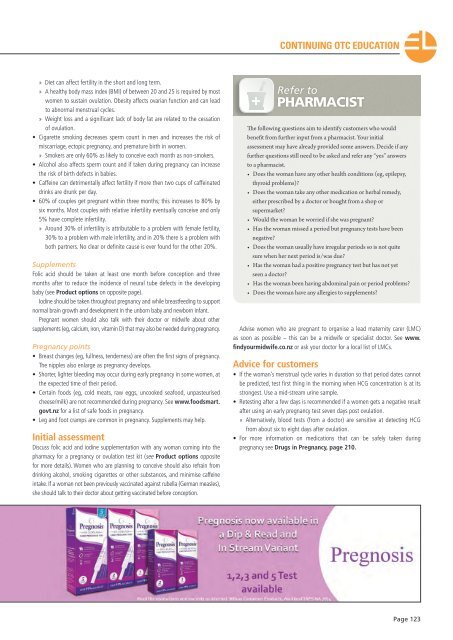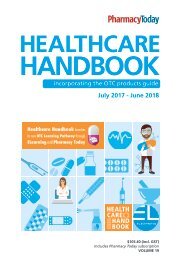2017 HCHB_digital
You also want an ePaper? Increase the reach of your titles
YUMPU automatically turns print PDFs into web optimized ePapers that Google loves.
CONTINUING OTC EDUCATION<br />
»»<br />
Diet can affect fertility in the short and long term.<br />
»»<br />
A healthy body mass index (BMI) of between 20 and 25 is required by most<br />
women to sustain ovulation. Obesity affects ovarian function and can lead<br />
to abnormal menstrual cycles.<br />
»»<br />
Weight loss and a significant lack of body fat are related to the cessation<br />
of ovulation.<br />
• Cigarette smoking decreases sperm count in men and increases the risk of<br />
miscarriage, ectopic pregnancy, and premature birth in women.<br />
»»<br />
Smokers are only 60% as likely to conceive each month as non-smokers.<br />
• Alcohol also affects sperm count and if taken during pregnancy can increase<br />
the risk of birth defects in babies.<br />
• Caffeine can detrimentally affect fertility if more then two cups of caffeinated<br />
drinks are drunk per day.<br />
• 60% of couples get pregnant within three months; this increases to 80% by<br />
six months. Most couples with relative infertility eventually conceive and only<br />
5% have complete infertility.<br />
»»<br />
Around 30% of infertility is attributable to a problem with female fertility,<br />
30% to a problem with male infertility, and in 20% there is a problem with<br />
both partners. No clear or definite cause is ever found for the other 20%.<br />
Supplements<br />
Folic acid should be taken at least one month before conception and three<br />
months after to reduce the incidence of neural tube defects in the developing<br />
baby (see Product options on opposite page).<br />
Iodine should be taken throughout pregnancy and while breastfeeding to support<br />
normal brain growth and development in the unborn baby and newborn infant.<br />
Pregnant women should also talk with their doctor or midwife about other<br />
supplements (eg, calcium, iron, vitamin D) that may also be needed during pregnancy.<br />
Pregnancy points<br />
• Breast changes (eg, fullness, tenderness) are often the first signs of pregnancy.<br />
The nipples also enlarge as pregnancy develops.<br />
• Shorter, lighter bleeding may occur during early pregnancy in some women, at<br />
the expected time of their period.<br />
• Certain foods (eg, cold meats, raw eggs, uncooked seafood, unpasteurised<br />
cheese/milk) are not recommended during pregnancy. See www.foodsmart.<br />
govt.nz for a list of safe foods in pregnancy.<br />
• Leg and foot cramps are common in pregnancy. Supplements may help.<br />
Initial assessment<br />
Discuss folic acid and iodine supplementation with any woman coming into the<br />
pharmacy for a pregnancy or ovulation test kit (see Product options opposite<br />
for more details). Women who are planning to conceive should also refrain from<br />
drinking alcohol, smoking cigarettes or other substances, and minimise caffeine<br />
intake. If a woman not been previously vaccinated against rubella (German measles),<br />
she should talk to their doctor about getting vaccinated before conception.<br />
Refer to<br />
PHARMACIST<br />
The following questions aim to identify customers who would<br />
benefit from further input from a pharmacist. Your initial<br />
assessment may have already provided some answers. Decide if any<br />
further questions still need to be asked and refer any “yes” answers<br />
to a pharmacist.<br />
• Does the woman have any other health conditions (eg, epilepsy,<br />
thyroid problems)?<br />
• Does the woman take any other medication or herbal remedy,<br />
either prescribed by a doctor or bought from a shop or<br />
supermarket?<br />
• Would the woman be worried if she was pregnant?<br />
• Has the woman missed a period but pregnancy tests have been<br />
negative?<br />
• Does the woman usually have irregular periods so is not quite<br />
sure when her next period is/was due?<br />
• Has the woman had a positive pregnancy test but has not yet<br />
seen a doctor?<br />
• Has the woman been having abdominal pain or period problems?<br />
• Does the woman have any allergies to supplements?<br />
Advise women who are pregnant to organise a lead maternity carer (LMC)<br />
as soon as possible – this can be a midwife or specialist doctor. See www.<br />
findyourmidwife.co.nz or ask your doctor for a local list of LMCs.<br />
Advice for customers<br />
• If the woman’s menstrual cycle varies in duration so that period dates cannot<br />
be predicted, test first thing in the morning when HCG concentration is at its<br />
strongest. Use a mid-stream urine sample.<br />
• Retesting after a few days is recommended if a women gets a negative result<br />
after using an early pregnancy test seven days post ovulation.<br />
» » Alternatively, blood tests (from a doctor) are sensitive at detecting HCG<br />
from about six to eight days after ovulation.<br />
• For more information on medications that can be safely taken during<br />
pregnancy see Drugs in Pregnancy, page 210.<br />
Page 123



